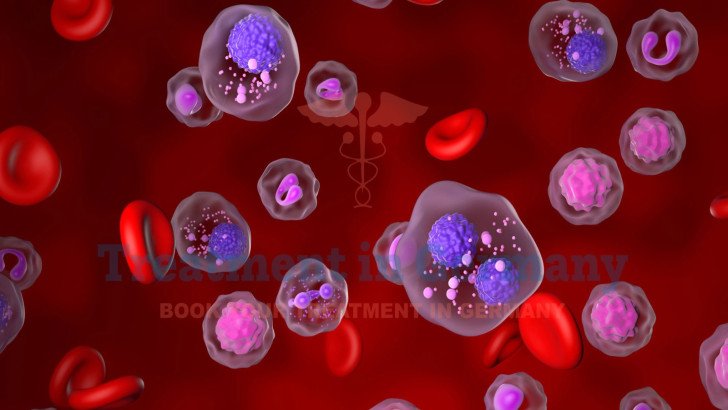
Multiple myeloma is a malignancy of plasma cells in the bone marrow, leading to bone destruction, kidney impairment, and weakened immunity.
Multiple myeloma, a complex blood cancer affecting plasma cells, poses significant treatment challenges due to its relapsing nature. Dendritic cell therapy offers a promising immunotherapy approach, providing hope for better outcomes in multiple myeloma patients. Germany, renowned for its expertise in advanced multiple myeloma treatment, leads in applying this innovative therapy, drawing patients worldwide.
Multiple myeloma is a malignancy of plasma cells in the bone marrow, leading to bone destruction, kidney impairment, and weakened immunity. Symptoms include bone pain, fatigue, and recurrent infections. While early-stage multiple myeloma may respond to standard treatments like chemotherapy or stem cell transplants, advanced or relapsed cases demand innovative solutions. Dendritic cell therapy harnesses the immune system to target myeloma cells, offering a tailored approach for resistant disease. German hospitals and cancer clinics integrate immunotherapy with traditional therapies to enhance survival rates.
Dendritic cell therapy is an advanced immunotherapy that utilizes dendritic cells, the immune system’s master antigen-presenters, to stimulate T cells against cancer. In multiple myeloma, dendritic cells are programmed to recognize tumor-specific antigens, such as M-protein or BCMA, eliciting a precise immune response. In Germany, this therapy is crafted with state-of-the-art laboratory techniques, ensuring minimal side effects. German oncologists develop dendritic cell vaccines customized to each patient’s tumor, transforming multiple myeloma treatment.
How Dendritic Cell Therapy Targets Multiple Myeloma
The German protocol for dendritic cell therapy employs a structured process to combat multiple myeloma:
German specialists use advanced diagnostics to ensure dendritic cell therapy delivers optimal results for multiple myeloma patients.
Germany’s Pioneering Role in Dendritic Cell Therapy for Multiple Myeloma
Germany’s leadership in advanced multiple myeloma treatment makes it a global hub for dendritic cell therapy. Cutting-edge university hospitals and cancer clinics provide innovative protocols, particularly for relapsed or refractory multiple myeloma, offering hope to patients with few alternatives.
Impact on Multiple Myeloma Care
Dendritic cell therapy is highly effective for advanced or relapsed multiple myeloma, where treatments like proteasome inhibitors or monoclonal antibodies lose efficacy. It targets antigens like BCMA or CD38, boosting immune responses against myeloma cells. German oncologists apply dendritic cell therapy after stem cell transplantation to prevent relapse or as a primary option for non-transplant candidates, significantly improving outcomes for multiple myeloma patients.
Combining with Standard Treatments
The German protocol integrates dendritic cell therapy with:
This collaborative approach, led by German surgeons and oncologists, ensures holistic multiple myeloma treatment.
Research and Clinical Trials
Germany’s prominence in clinical trials for multiple myeloma grants access to experimental dendritic cell therapies, often unavailable in the UK or US. These trials investigate combinations with CAR T-cell therapy or novel checkpoint inhibitors, showing potential to extend remission periods. German cancer clinics lead global efforts, providing multiple myeloma patients with pioneering treatment options.
Why Germany Leads in Dendritic Cell Therapy for Multiple Myeloma
Germany offers compelling advantages for multiple myeloma patients pursuing dendritic cell therapy:
Clear Treatment Plans: German cancer clinics provide transparent protocols, supporting informed decisions.
Risk Factors and Prevention Strategies for Multiple Myeloma
Key risk factors for multiple myeloma include:
German specialists promote healthy weight, regular screenings, and monitoring for high-risk groups to mitigate multiple myeloma risk.
Precision Diagnosis for Multiple Myeloma in Germany
Effective multiple myeloma treatment hinges on accurate diagnosis. German hospitals utilize:
German radiologists and pathologists deliver precise staging, optimizing immunotherapy approaches.
Post-Treatment Support and Quality of Life
Following dendritic cell therapy, German cancer clinics offer robust follow-up care:
Germany’s patient-centric approach ensures multiple myeloma patients achieve lasting recovery.
Challenges and Future Innovations
Dendritic cell therapy encounters challenges, such as variable immune responses and intricate vaccine production. German researchers are tackling these with:
Future developments may include AI-driven antigen profiling and expanded use in early-stage multiple myeloma.
Conclusion
Dendritic cell therapy is reshaping multiple myeloma treatment, offering a beacon of hope for multiple myeloma patients with relapsed or refractory disease. The German protocol for dendritic cell therapy delivers personalized immunotherapy, seamlessly blending with conventional therapies to enhance survival and quality of life. Germany’s leadership in advanced multiple myeloma treatment, fueled by innovative clinical trials and world-class hospitals, positions it as a top destination for patients seeking transformative care. With the expertise of German doctors and cutting-edge technology, dendritic cell therapy is paving the way for better outcomes in the fight against multiple myeloma.
Frequently Asked Questions
What is dendritic cell therapy for multiple myeloma in Germany?
It’s a tailored immunotherapy using dendritic cell vaccines to target multiple myeloma cells, offered at leading German cancer clinics.
How does dendritic cell therapy enhance multiple myeloma outcomes?
It triggers precise immune responses, reducing relapse and improving survival.
Which facilities offer dendritic cell therapy for multiple myeloma in Germany?
Specialized university hospitals and cancer clinics provide advanced multiple myeloma treatment.
Are clinical trials for dendritic cell therapy available in Germany?
Yes, German cancer clinics offer trials combining dendritic cell therapy with novel immunotherapies.
Is follow-up care provided after dendritic cell therapy in Germany?
Yes, including MRI, rehabilitation, and emotional support.
How does Germany compare to the UK/US for multiple myeloma treatment?
Germany leads in innovative multiple myeloma therapies, faster access, and holistic care.
Can dendritic cell therapy prevent multiple myeloma relapse?
It targets residual cancer cells, reducing relapse risk.
Does Germany support international patients?
Hospitals in Germany offer language assistance, travel coordination, and psychological support.
What are the latest advancements in dendritic cell therapy for multiple myeloma in Germany?
Germany pioneers mRNA-based dendritic cell therapy and combinations with CAR T-cell therapy.
How does dendritic cell therapy differ from traditional treatments for multiple myeloma?
Unlike chemotherapy, dendritic cell therapy offers targeted action with fewer side effects, enhancing quality of life.
For further details, visit our contact us page
Kindly complete the form below, and our dedicated team will reach out to you promptly. We look forward to connecting with you soon!
Trierer Straße, 56072 Koblenz, Germany
.webp)
.webp)
 (1).webp)
 (1).webp)

.webp)
.webp)
 (1).webp)
 (1).webp)
